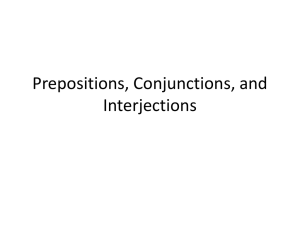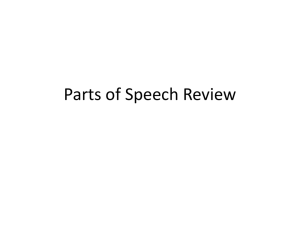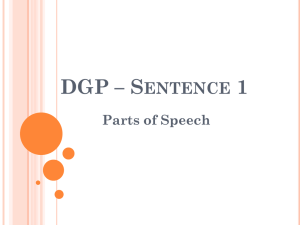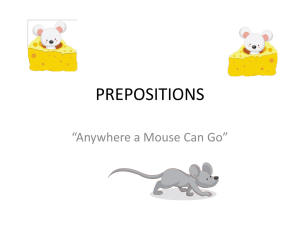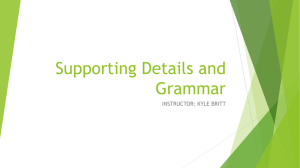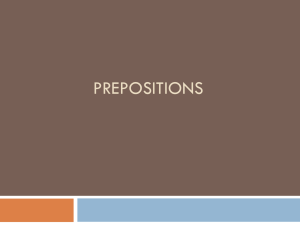Prepositons - English with Ms. Martin
advertisement
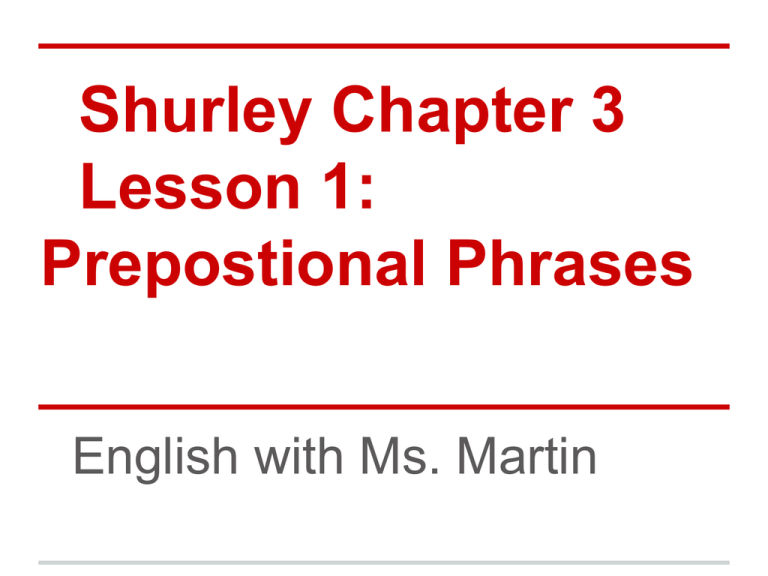
Shurley Chapter 3 Lesson 1: Prepostional Phrases English with Ms. Martin Prepositional Phrase Jingle I’ve been working with PREPOSITIONS ‘Til I can work no more. They just keep connecting their OBJECTS To the rest of the sentence before. When I put them all together, The PREP and its NOUN or PRo, I get a PREPOSITIONAL PHRASE, That could cause my mind to blow. Prepositions: Labeled with a P A preposition is a joining word. It joins a noun or a pronoun to the rest of the sentence. To know whether a word is a preposition, say the preposition word and ask What or Whom. If the answer is a noun or pronoun, then the word is a preposition. Object of the Preposition: OP An object of the preposition is a noun or pronoun after the preposition in a sentence. Difference between Prepositons and Adverbs The same word can be either a preposition or an adverb depending on how it is used in the sentence. For example: The word down can be a preposition or an adverb. How do you decide? If down is used alone, with no noun after it, it is an adverb. If down has a noun after it that answers the How do you decide? How do you decide? If down is used alone, with no noun after it, it is an adverb. If down has a noun after it that answers the question what or whom, then down is a preposition…...that makes the noun after down (the preposition) an………………………………………………… …………………………………………………… …... Object of the preposition (OP) Examples John fell down. The word down is an adverb because it does not have a noun after it. John fell down the stairs. The word down is a prepostion because it has the noun stiars (OP) after it. How do we say it in the Q & A flow? down-P (say: down-preposition) down what?- stairs- OP (say: down what? stairs- object of the preposition) Prepositional Phrase Starts with the preposition and ends with the object of the preposition. It includes any modifiers between the preposition and object of the preposition. A prepositional phrase adds meaning to a sentence and can be located anywhere in a sentence. This is important! This helps your writing! This makes your writing more descriptive! Prepositional Phrases ...are identified in the Q & A flow after you say the word check. Now, when you say check, you are looking for prepositional phrases in the sentence. What do you do when you find one? So, you found a prepositional phrase after you said check? In the flow, read the whole prepositional phrase and then put parentheses around it. If there is more than one prepositional phrase in the sentence, read all the prepositional phrases during the check time. The Flow will go like this…. After you classify the sentence, Joe went to town, you will now say “Subject Noun Verb Pattern 1-check: (to town)prepositional phrase” A Preposition’s Relationship to Its Object For example, a preposition might tell the relationship an ant has to a tree: The ant can be (in the tree), (on the tree), (over the tree), (under the tree), (up the tree), (down the tree), (of the tree), etc. Note: A preposition will tell what the relationship of its object is to the word the phrase modifies. Now I will show you how to classify a prepositional phrase... Follow along with the handout and sentence strip! Adverb Exception Now we are going to add something new to the Q & A Flow. This new part is a check for an adverb exception. Most adverbs which modify the verb are located after the verb; therefore, they are located in the predicate part of the sentence. Since the verb usually starts the predicate, these adverbs are part of the predicate. Adverb Exception ...occurs when you have an adverb immediately BEFORE the verb that modifies the verb. As a result, the predicate will now start with adverb that is immediately before the verb. (The student/ quickly stepped inside the classroom.) In the Question and Answer Flow... AFTER you say “Go back to the verb- divide the complete subject from the complete predicate,” then you ask “Is there an adverb exception?” If there is not an adverb before the verb, you say “Yes-change the line.” To show the adverb exception, simply erase your slash mark and put it in front of the adverb that is immediately before the verb. (The dog swiftly/ retreated.) (The dog/ swiftly retreated.) Q & A Flow Now I will show you how to add the adverb exception to the Question and Answer Flow. Classify the sentence with me until we get to the new part in the Question and Answer Flow. The intense runners anxiously raced forward at the sound of the gun. Natural and Inverted Word Order in a Sentence A sentence that is in a natural order has all subject parts first and all predicate parts after the verb. A sentence that is in an inverted order will have predicate words in the complete subject. There are three way that predicate wards are sometimes found in the complete subject: What are those three ways? 1.) A prepositional phrase at the beginning of a sentence will modify the verb. (Example: After lunch we/ went home.) 2.) A helping verb at the beginning of a sentence will always be part of the verb. (Example: Are you/ going to the concert?) 3.) An adverb at the beginning of the sentence will modify the verb. (Example: Yesterday we/ went to my grandfather’s house.) Q & A Flow In the flow say, “Is there an adverb exception?” Then you ask, “ Is this sentence in a natural or inverted order?” If there are no predicate words in the complete subject, then you say, “Natural- No change” If there are predicate words in the complete subject, then you say, “Inverted-Underline the subject parts once and the predicate parts twice.” Inverted To show inverted order, draw one line under the subject parts and two line under the predicate parts. Q & A Flow Now I will show you how to add the natural and inverted word order part to the Q & A Flow. You will classify the sentence with me until we get to the new part in the Q & A Flow. After summer vacation the football players eagerly gathered around the coach in the locker room. Q & A Flow Yesterday the dense fog finally lifted in the late afternoon. Today the band members worked very hard on the competition music.


